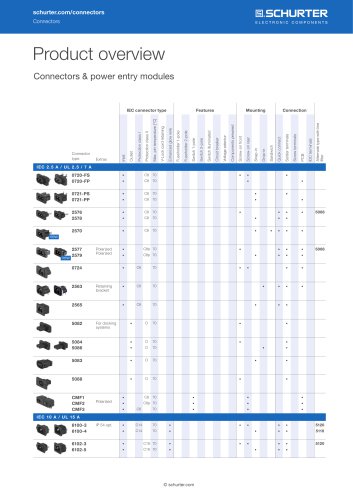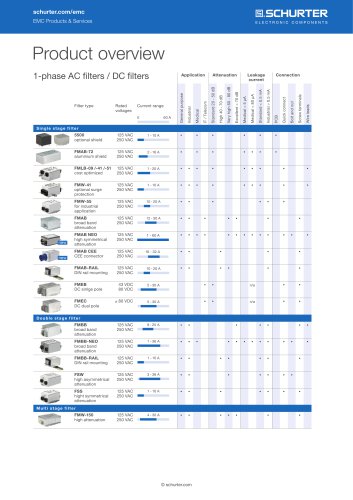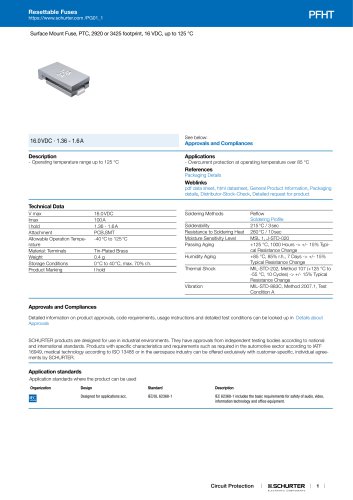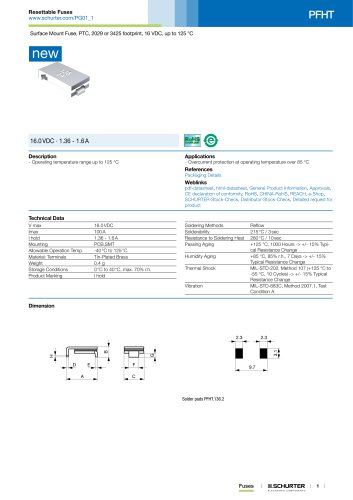Catalog excerpts
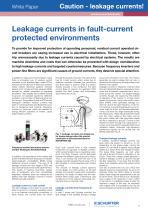
White Paper Caution - leakage currents! schurter.com/downloads Leakage currents in fault-current protected environments To provide for improved protection of operating personnel, residual current operated circuit breakers are seeing increased use in electrical installations. These, however, often trip unnecessarily due to leakage currents caused by electrical systems. The results are machine downtime and costs that can otherwise be prevented with design consideration to high leakage currents and targeted countermeasures. Because frequency inverters and power-line filters are significant causes of ground currents, they deserve special attention. In addition to fuses and circuit breakers, today there is increasing use of residual current operated circuit breakers (also called RCDs, residual current devices) in electrical systems. Fuses protect electrical systems primarily against short circuits and fires, whereas RCDs provide for reliable protection of operating personnel. They register fault currents flowing to ground, for example caused by defective insulation, and cut them off before anyone can be harmed. The problem is that a RCD cannot distinguish between residual currents that arise in normal operation and those that occur due to dangerous fault currents. Frequency inverters in particular, which are needed for energy efficient operation of motors, cause large residual currents. through the neutral conductor. The same holds true for a fault current, which arises due to defective insulation between live conductors and flows back to ground. Even if a person directly touches a live conductor, the fault current flows to ground. An upstream RCD detects this fault current and immediately disconnects the circuit. Fig. 1: Leakage currents are dangerous for human beings when the ground conductor is disconnected (source: SCHURTER AG) Frequency inverter and motors (source: Control Techniques AG Switzerland) In addition, the capacitance of the cables and power-line filters that are necessary to maintain electromagnetic compatibility (EMC) create additional ground currents. The sum of all leakage currents can thus trigger a RCD and shut down all loads on the same cable harness. This results in machine downtime, causes loss of production and thus considerable expenses. However, there are measures for dealing with high leakage currents to ensure efficient yet safe operation. Leakage current vs. fault current The term leakage current refers to current that flows to ground in a properly operating circuit or to an external conductive component. In other words, the current does not return Such fault currents have a high resistive component as opposed to leakage currents, which predominately have a capacitive reactance. The RCD, however, cannot distinguish between the different types of ground currents. Thus, it can already trip when the sum of all leakage currents exceeds the trip value. This is also possible in normal operation even if there is no fault. The amount of leakage current depends on the design of a drive system, on the grid voltage, the inverter's pulse-width modulation frequency, the length of cables and the interference filters being used. Furthermore, grid impedance and the system's grounding concept also play an important role. Leakage currents from frequency inverters circuit and smoothed. From this, the inverter generates an output voltage that can vary in amplitude and frequency corresponding to the desired motor speed. Leakage currents in frequency inverters arise through internal interference-suppression measures and all parasitic capacitances in the inverter and motor cables. The largest leakage currents, though, are caused by the method of operation of the inverter. It controls motor speed continuously using pulse-width modulation (PWM), which generates leakage currents far above the grid frequency of 50 Hz. For instance, the switching frequency of an inverter might be 4 kHz, and the associated harmonics can have very large amplitudes at higher frequencies. These frequencies then travel over the motor cables to the motor, and so the motor cables with their grounded shields act like a capacitor to ground. Current is then diverted to earth through this capacitance. It is thus recommended to separate filtered and unfiltered cables, otherwise high-frequency interference signals can be carried over the filtered cable (see Fig. 2). Transient leakage currents In addition, transient leakage currents can arise when the system is turned on or off. Depending on the phase angle, turning the system on, can result in steeply rising voltage spikes as a result of the fast voltage increase. The same thing happens, as well, when the unit is turned off due to inductivity in the circuit. These fast voltage spikes generate a transient leakage current to ground through the filter capacitors. It can arise that the RCD shuts down operation when the system is first turned on. One way to prevent this is to use a RCD with delayed response characteristics. So as to not seriously hinder the RCD's ability to provide safety, these response characteristics are set to narrow limits. Type B RCDs as a rule already have a delay in the response. If such a RCD is not built in, it is relatively simple to start the machine in steps. In this way, for machines with multiple units, it is possible to start up the various frequency inverters one after the other. In both 1-phase and 3-phase inverters, the grid voltage is first rectified through a bridge
Open the catalog to page 1
Caution - leakage currents! White Paper schurter.com /downloads Residual current operated circuit breaker Input filter Rectifier Frequency inverter Intermediate circuit Output filter Motor cables Fig. 2: Typical leakage currents in a motor drive with a frequency inverter (source: SCHURTER AG) Fig. 3 shows the tripping characteristic curve of a Type B+ RCD that is sensitive to all currents. This breaker handles all fault currents up to 20 kHz. The trip value of 30 mA is specified in the range of a grid frequency of 50 Hz because the possibility of a fault current is largest there. The...
Open the catalog to page 2All SCHURTER catalogs and technical brochures
-
FMAD NEO
6 Pages
-
SUSTAINABILITY REPORT 2022
37 Pages
-
THS
5 Pages
-
TTS
4 Pages
-
Product News
4 Pages
-
FMAB NEO
12 Pages
-
FPG1
4 Pages
-
FMAB HV
6 Pages
-
UMT-W
4 Pages
-
OGN
3 Pages
-
0712
3 Pages
-
CPS
7 Pages
-
DG12
10 Pages
-
4751
4 Pages
-
FMAD CP
4 Pages
-
4783
4 Pages
-
EF11
8 Pages
-
PFRY
4 Pages
-
PFRA
6 Pages
-
PFMF
4 Pages
-
PFDF
3 Pages
-
Company Profile
20 Pages
-
Voltage Selector
1 Pages
-
Resettable Fuses
1 Pages
-
6051.2067
3 Pages
-
6051.2068
3 Pages
-
Suppression Chokes DKIH-1
6 Pages
-
4797-5
4 Pages
-
6051.2063
3 Pages
-
6051.2061
3 Pages
-
6051.2015
3 Pages
-
3-108-993
2 Pages
-
3-100-361
3 Pages
-
GP21
3 Pages
-
AURORA Complete Solutions
2 Pages
-
FMER SOL
10 Pages
-
CMF2, CMF5
3 Pages
-
CDS1
5 Pages
-
DKIH-3
6 Pages
-
4710-5
5 Pages
-
Touchkit
3 Pages
-
USN 1206
3 Pages
-
FPBB RAIL
7 Pages
-
DD14
8 Pages
-
VAC19KS
3 Pages
-
UMK 250
4 Pages
-
TA35 Rocker 1Pole
6 Pages
-
4761
3 Pages
-
4732
4 Pages
-
FUS
3 Pages
-
DKIH
6 Pages
-
FSO
2 Pages
-
CSO
3 Pages
-
CMF1, CMF4
3 Pages
-
FMAC NEO
5 Pages
-
MSM DP 30
8 Pages
-
PSE AE 16
3 Pages
-
MSM LA CS 22
7 Pages
-
MSM LA CS 19
6 Pages
-
PSE AE 30
5 Pages
-
PSE EX 16
5 Pages
-
PSE EX 19
5 Pages
-
PSE NO 19
6 Pages
-
PSE NO 16
6 Pages
-
PSE EX 22
5 Pages
-
PSE NO 27
6 Pages
-
PSE NO 24
6 Pages
-
PSE NO 22
8 Pages
-
PSE IV 16
6 Pages
-
PSE HI 22
6 Pages
-
PSE NO 30
7 Pages
-
PSE M22 IV
7 Pages
-
MCS ES 18
3 Pages
-
MCS ES 22
3 Pages
-
6051.2094
3 Pages
-
6051.2093
3 Pages
-
6051.2078
3 Pages
-
6051.2077
3 Pages
-
6051.2070
3 Pages
-
6051.2072
3 Pages
-
6051.2071
3 Pages
-
6051.2037
2 Pages
-
6051.2030
3 Pages
-
6051.2032
3 Pages
-
6051.2031
3 Pages
-
6051.2027
3 Pages
-
3-107-570
2 Pages
-
3-107-569
2 Pages
-
VAC13KS
4 Pages
-
DD21
5 Pages
-
DD11
5 Pages
-
DF11
6 Pages
-
DG11
7 Pages
-
typ_6051.2016
3 Pages
-
typ_6051.2008
3 Pages
-
typ_6051.2009
3 Pages
-
typ_6051.2001
4 Pages
-
typ_6051.2007
3 Pages
-
typ_6051.2003
3 Pages
-
typ_6051.2004
3 Pages
-
typ_4762
3 Pages
-
typ_3-101-514
3 Pages
-
typ_3-101-501
3 Pages
-
typ_3-100-528
3 Pages
-
typ_3-100-734
3 Pages
-
typ_3-100-526
3 Pages
-
typ_3-100-523
3 Pages
-
typ_3-100-524
3 Pages
-
typ_3-100-527
3 Pages
-
typ_3-100-522
3 Pages
-
typ_3-100-356
3 Pages
-
typ_3-100-355
3 Pages
-
typ_3-100-354
3 Pages
-
Application Note Surge
2 Pages
-
White Paper IP Protection
2 Pages
-
SWA2
2 Pages
-
PB 1021
2 Pages
-
TM12-111
6 Pages
-
PTS
4 Pages
-
Piezo Keypads
4 Pages
-
PB 1011
2 Pages
-
FMAD CEE
3 Pages
-
White Paper Data Center
4 Pages
-
White Paper SPICE library
4 Pages
-
White Paper Cord retention
4 Pages
-
SCHURTER and ESA cooperation
2 Pages
-
Efficient EMC Solutions
8 Pages
Archived catalogs
-
2020 PFHT
3 Pages
-
Product News 2018
4 Pages
-
SCHURTER Company Profile
10 Pages
-
PFDF
3 Pages
-
2015 PFHT
3 Pages
-
PFUF
3 Pages
-
SCHURTER Renewable Energies
6 Pages
-
SCHURTER Product News 2015
4 Pages
-
DKFP
5 Pages
-
FMAD RAIL
3 Pages
-
FMAC RAIL
3 Pages
-
FMBD NEO
6 Pages
-
FMAC SINE DCL
4 Pages
-
FMAC SINE
4 Pages
-
FMAB RAIL
3 Pages
-
FMBB NEO
11 Pages
-
FMBB RAIL
3 Pages
-
5120
10 Pages
-
SMD-FTT
1 Pages
-
OMZ 125
1 Pages
-
4840.2200
2 Pages
-
6051.5003
2 Pages
-
6000.0224
2 Pages
-
6051.2030
2 Pages
-
6051.2003
2 Pages
-
FLBB
2 Pages
-
4741
2 Pages
-
P685
2 Pages
-
KE
4 Pages
-
GSF2
4 Pages
-
GSF1
5 Pages
-
Felcom 64
4 Pages
-
6135
5 Pages
-
KG-Bowdencable
4 Pages
-
KD-Bowdencable
4 Pages
-
DC21
3 Pages
-
1074
4 Pages
-
DC11
5 Pages
-
CMF3, CMF6
2 Pages
-
PFNF
3 Pages
-
ESO 10.3x38
1 Pages
-
SHT 6.3x32
1 Pages
-
Product Overview Switches
2 Pages
-
KEB2
1 Pages
-
New product: 6610
3 Pages
-
New product: UMZ 250
3 Pages
-
New product: CSO
2 Pages
-
New product: UST 1206
2 Pages
-
New product: UMF 250
3 Pages
-
New product: UMT-H
3 Pages
-
TA35 Rocker 2Pol
8 Pages
-
SCHURTER range at a glance
236 Pages
-
ASO / FSO
8 Pages
-
Flyer UMT 250 / UMZ 250
8 Pages
-
SCHURTER - Flyer MSM CS
2 Pages
-
Varistors
40 Pages
-
Flyer MGA-S
6 Pages

















































































































































